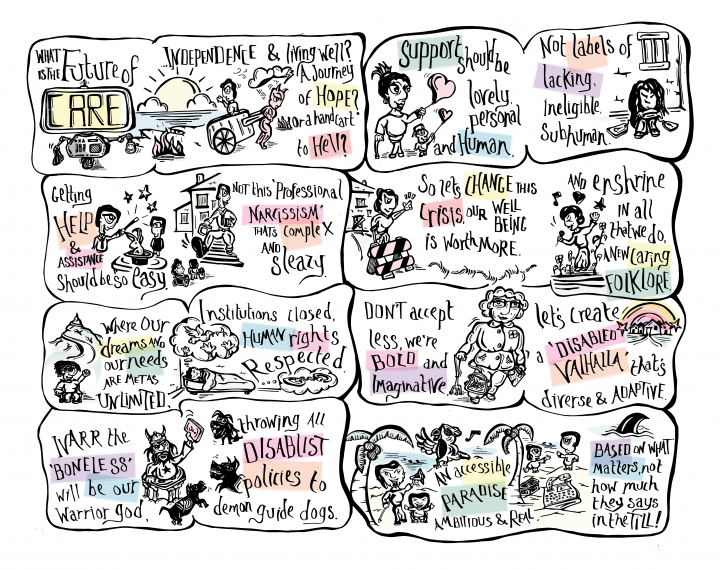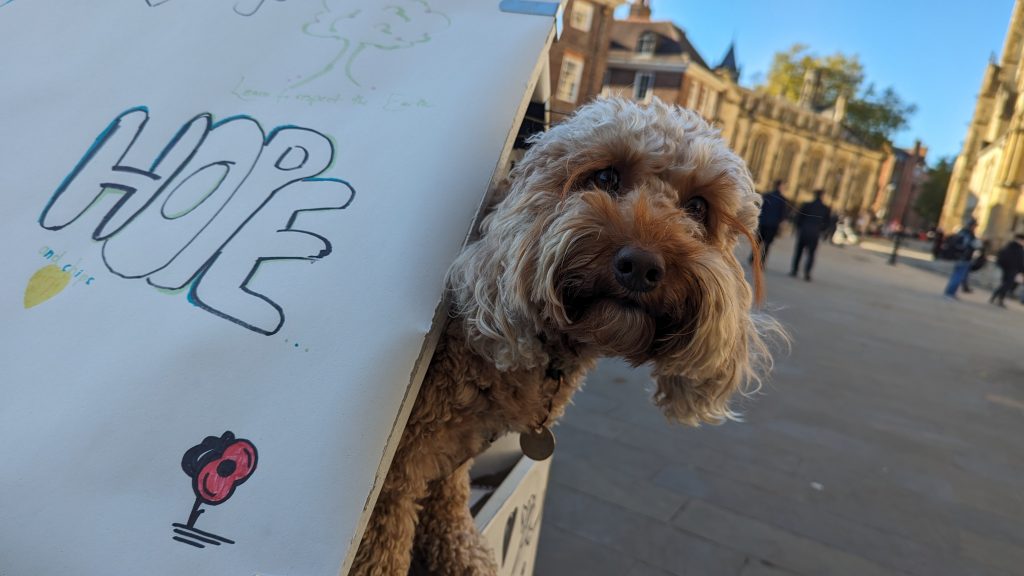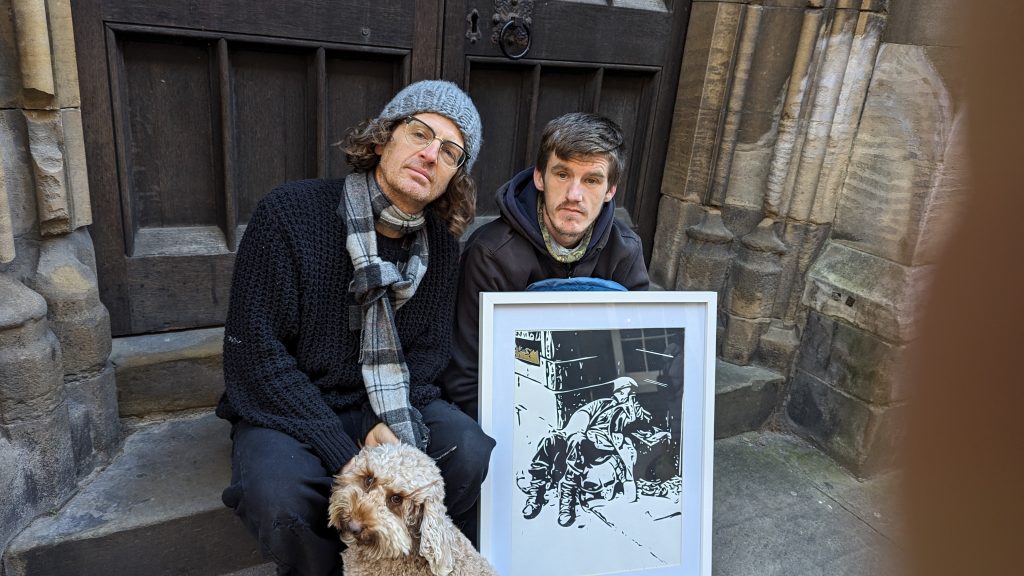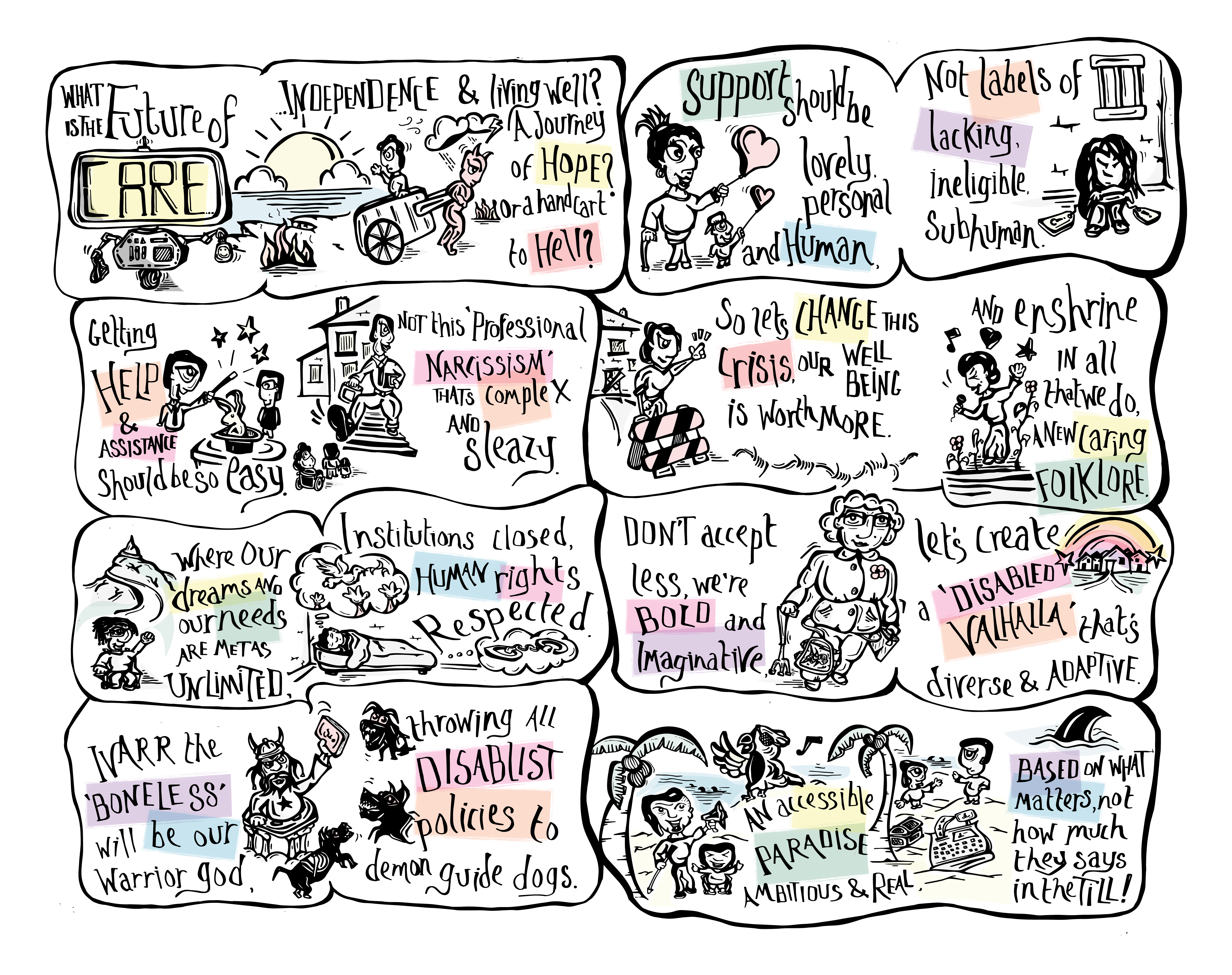For last few months I have been pulling around York a ‘doodling’ handcart complete with paper and pens asking people a question scribbled on its side, that is;
‘What is the future of care, independence and living well? Is it hope or hell in a handcart?’
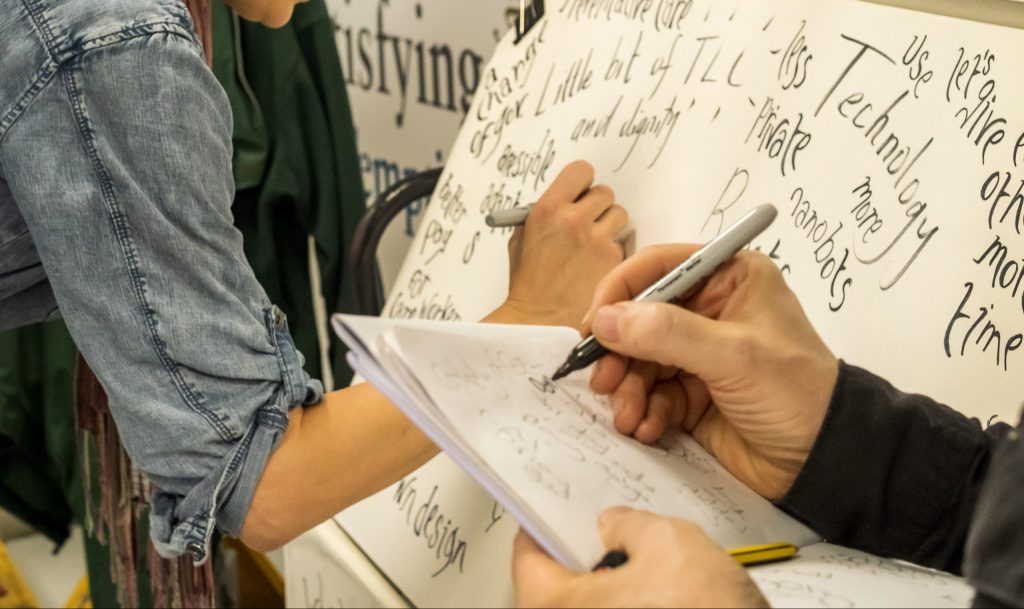
I took the cart to many places around York, the library, the hospital, the cancer care treatment centre, a Parkinson’s support group, the university, a wellbeing group at the art gallery, just out and about in the street and also by email, video call and text. I spoke to loads of different people, disabled people, carers, workers, advocates, activists and others. People added doodles and statements to the cart, or shared things for me to note.
I have for a long time wanted to create a something portable that would enable conversations about important issues that affect us all, but that are often only discussed in ‘professional’ spaces. While some organisations do invest time and effort in understanding what people want and embedded lived experience into their practise, this varies considerably. So with the help of the Arts Truth Rights project and local artist and maker Rob, the I built the cart and took it round York asking people questions about the future of care.
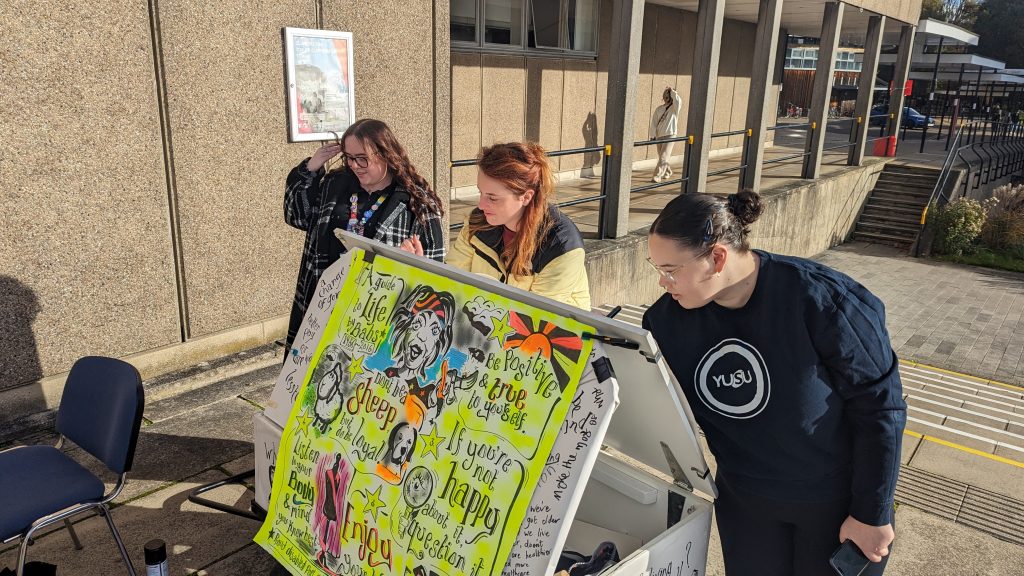
And to sum up what people have said to me, it’s ‘hell we’re heading for sure’. Sadly too, for some they say, hell feels not that far away. The lack of help and assistance, the push back from services, the guilt they are made to feel, the costs and the inhuman ‘professional’ responses to need and wellbeing burns painfully deep in everyday lived experience.
The scale of the problem is huge, complicated beyond comprehension and feels undoable. The feeling in York is not unique. Elsewhere as ‘The Campaign for Real Care’ and others highlight, resources are not working for people, the workforce is undervalued, local infrastructure has been striped bare and practise and policy bump along in a contradictory cycle. Indeed, many aspects of The Care Act, that would make a difference are not being implemented by public bodies.
That said, people are hopeful about what is possible, and more importantly full of ideas about how to change the tragic crisis that we face. Thinking though what has been shared with me, I see five things, that people want the future of care to be;
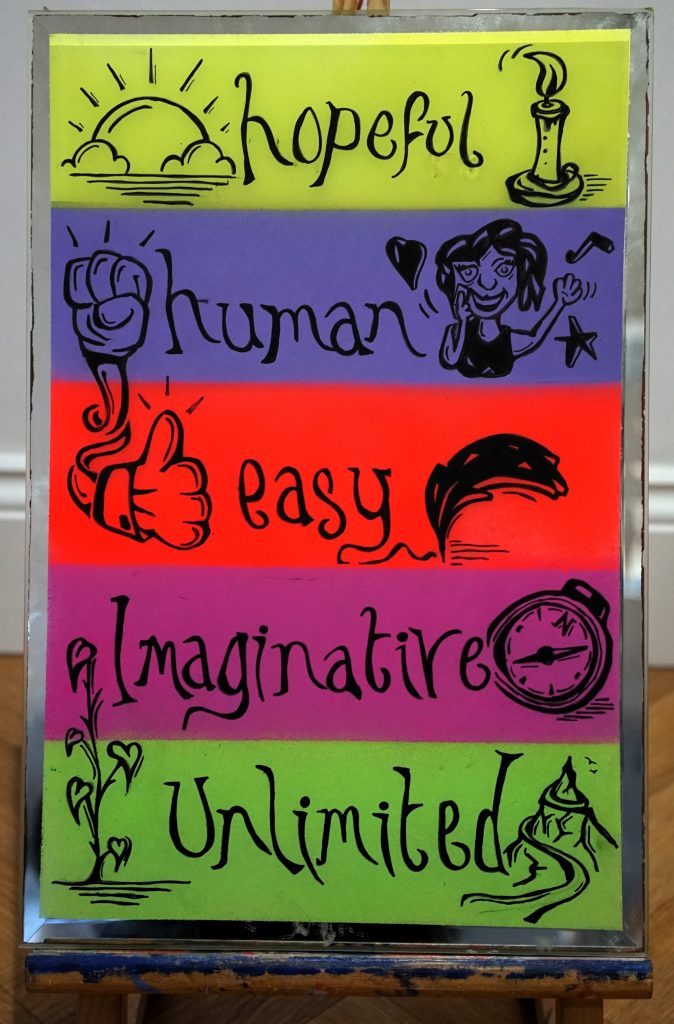
- Hopeful – Barry, the son, and Isabel, the mum said what we need is ‘good love, good homes and good people’. They told me that they had a hamster once and was told that it would live for 3 years. Barry said he loved this hamster so much that it lived for 6. So if we bring love and hope, we can make literally life changing changes.
- Human – Trish described themselves as a ‘positive homeless person trying to break their attachment to things’. They said the want to see less machines, more humanity and a sunny cabin that’s easy to access and open to all. A place that focuses on humans and their rights, not uncaring, pathological labels that judge and exclude on the basis of biased values or the money in their pockets.
- Easy – Ash said that they get social care support, but its far less than they need. The family make up the short fall. If they can’t cover the support, Ash is told they can go live in a care home. The Care Act says they are entitled to support. The local authorities say they are not. Ash feels unsafe and unwell. Local officialdom says it knows best. The system could be much easier.
- Imaginative – Kay says she dreams of a ‘disabled valhalla’. An accessible paradise where we acknowledge our bodies, and minds as disabled by default. Not ‘normal’ first or ‘broken’ as other. But where all bodies, and minds can achieve positive states of wellbeing regardless. Imagining better things from the full range of lived experience offers richer opportunities for change.
- Unlimited – Mik said he had symptoms of a degenerative illness but couldn’t get the tablets until he had a diagnosis. The waiting list is 18 months. Clara said she has been diagnosed with dementia and needs a home carer but cant afford the care charges she told she’ll have to pay due to debts. Both their lifestyles are limited. So we need to rethink resources, the real cost of things and what it is we value more, wealth or our wellbeing? We must no longer limit our opportunities.
So a what I take from this is that a priority for resources and all the responses that could be available to people is that they be more hopeful not fearful, human not demeaning, easy not bureaucratic, brightly imaginative and ultimately, unlimited in their value and support for all folk and communities.
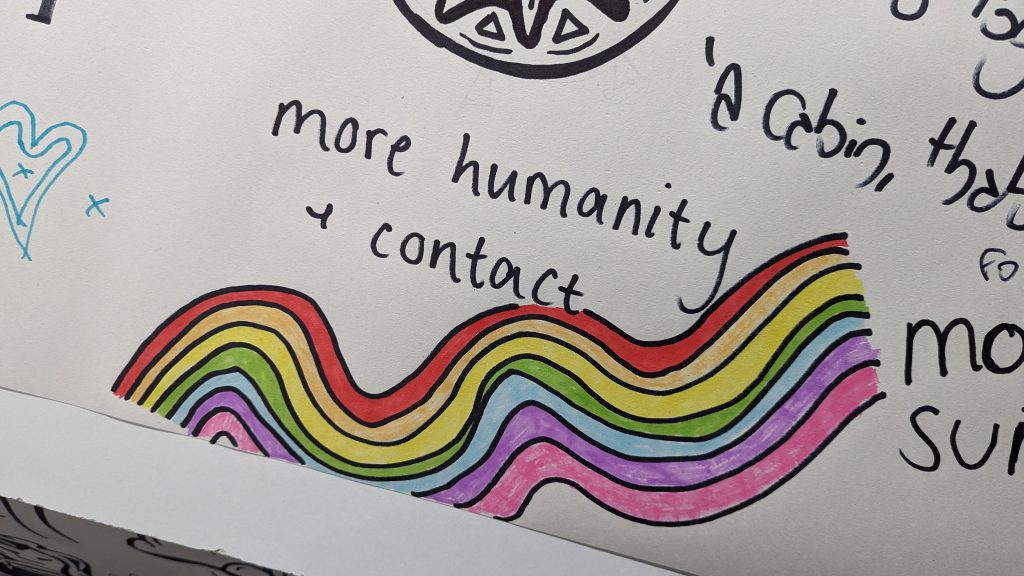
In addition to what the good people of York say, practical solutions to the current crisis can also be found elsewhere. In ‘The Future of Social Care From Problem to Rights-Based Sustainable Solution’ Peter Beresford and Colin Slasberg argue for a new human rights based system and approach, free at the point of encounter, coproduced and accountable to lived experience, focused on dignity and respect, decolonisation and environmentally sustainability. Similarly, the ‘Reclaiming Our Futures Alliance’ assert a National Independent Living Service (NILS), like an NHS, to provide the right type, amount and quality of assistance.
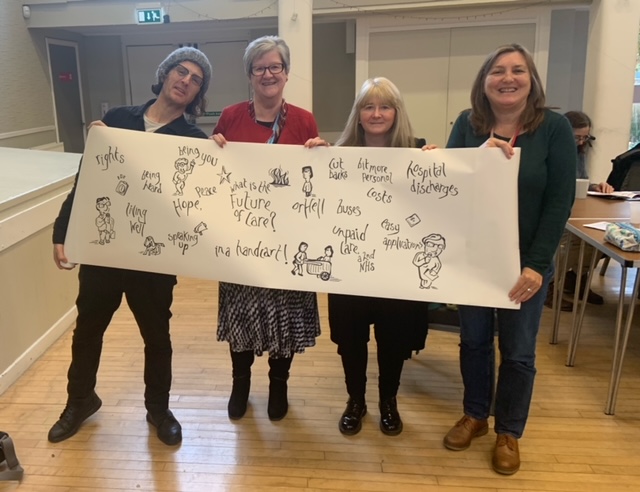 But while both approaches are full hope, provide an immediate plan of action and would practically make a massive difference, I can’t overlook that they are bound and restrained by money. Not so much that there isn’t enough, as both set out the financial benefits of investing in independent living and quality care. That is, greater economic activity and improved health benefits contribute to a positive and good society. Rather they are restrained by the fact that financial wealth is given more value than human health, wellbeing and care. The current model of economics favours markets, not people. We to redress this imbalance, and assert more of a community wealth building approach, such as The Centre for Local Economic Strategies advocate for.
But while both approaches are full hope, provide an immediate plan of action and would practically make a massive difference, I can’t overlook that they are bound and restrained by money. Not so much that there isn’t enough, as both set out the financial benefits of investing in independent living and quality care. That is, greater economic activity and improved health benefits contribute to a positive and good society. Rather they are restrained by the fact that financial wealth is given more value than human health, wellbeing and care. The current model of economics favours markets, not people. We to redress this imbalance, and assert more of a community wealth building approach, such as The Centre for Local Economic Strategies advocate for.
And unless we are honest about this in the long term nothing will really change.
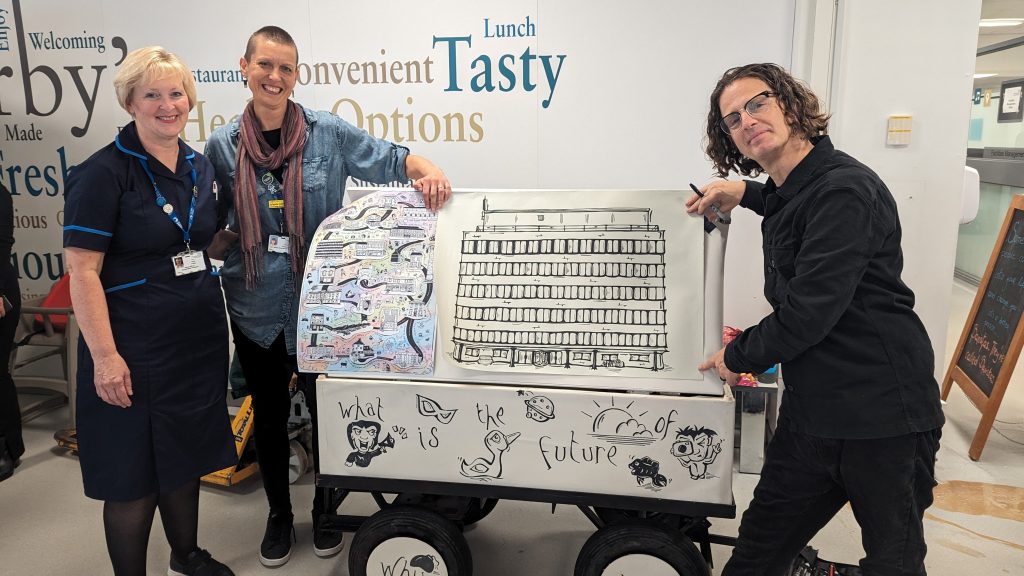
So if the future of care is to be one of hope we must really question our value in this respect. What’s really more important? Budgets and the bottom line or our personal and collective wellbeing and community wealth? I may not be able to imagine a care and wellbeing response running totally sustainably, beyond money, free, dignified and effective at the point of encounter in say 10 years.
But with hope and a human rights approach that’s amazingly imaginative I can see this as becoming a reality longer term. And our challenge is that we embed a human rights and community wealth perspectives in all that we do and commit to developing this right now.
Many thanks to all those that shared stories and suggestions. The project was funded through and Arts Truth Rights commission for Conversations with KIOSKs through The Centre for Applied Human Rights at the University of York in 2023.
Finally, here’s a doodled rhyme, summarising my reflections.
Stephen Lee Hodgkins, January 2024.
